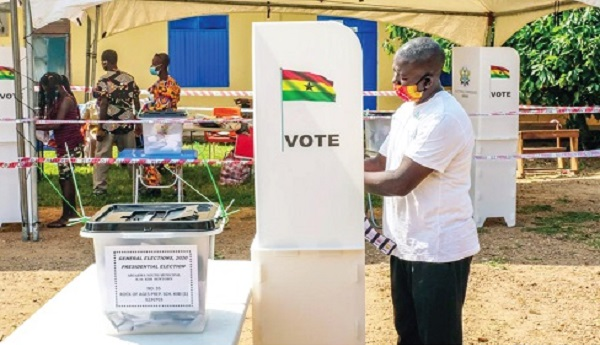
Beyond the ballot box
One of the fundamental features of electoral democracies is the right to vote. Every citizen as per the rules specified in the constitution gets to vote.
Advertisement
Democracies hold regular competitive elections that allow citizens to exercise this right. The right, although constitutionally guaranteed, does not necessarily mean all citizens will exercise it. However, it is the expectation that a good number of citizens will vote regularly to sustain the vibrancy of democracy.
When it comes to national elections, one can count on Ghanaians to show up and vote. In examining publicly available data, voter turnout in presidential elections has ranged between 54 per cent in 1992 and 85 per cent in 2004. Across all eight elections in the life of the Fourth Republic, average voter turnout is about 72 per cent.
The curious thing about our elections is that in change elections, where the incumbent party loses to the main opposition party, voter turnout tends to be lower (2000, 2008, 2016) than in non-change elections where the incumbent party wins re-election (1996, 2004, 2012, 2020). The average voter turnout gap between change and non-change elections is about 13 percentage points.
So, when it comes to voting, the Ghanaian voter can be trusted to show up. And as I shared recently, in the National Commission for Civic Engagement’s election year research (Matters of Concern to the Ghanaian Voter) when Ghanaians were asked why they were willing to vote in 2016 and 2020, the number one reason cited was civic responsibility.
After we are done voting
While we cite our civic responsibility as the main reason for our willingness to vote in an election, that urgency appears to fade once elections are over.
Why do I say that?
Ghanaians generally do not participate in collective action activities. In the maiden round (1999) of the Afrobarometer survey, when asked whether they “participate with others to address an important problem affecting the community or nation,” 53 per cent said they do. In the most recent round of the survey (2022), only 33 per cent per cent said they do, showing a significant decline in this form of civic engagement. In 1999, when asked whether they “attend a demonstration or protest march,” eight per cent answered affirmatively. In the most recent round (2022), only six per cent answered affirmatively.
Besides our low participation in collective action activities, we also do not contact our elected public officials that much. In 2002, when Afrobarometer asked “during the past year, how often have you contacted any of the following persons for help to solve a problem or to give them your views: A member of parliament?” only 12 per cent indicated having done so at least once. In the most recent round (2022) only 15 per cent responded similarly.
When asked “during the past year, how often have you contacted any of the following persons about some important problem or to give them your views? An assemblyman or woman?” only 15 per cent indicated having done so at least once. In the most recent round (2022), that increased significantly to 36 per cent.
Food for thought
The question then is why do our civic habits look this way? Active citizens who vote but generally disengaged citizens after voting.
Is it a lack of interest in national affairs? Matters of public affairs must be important enough for citizens to want to be involved. In Round 2 (2002) when the survey asked, “How interested would you say you are in public affairs?” 74 per cent said “somewhat or very interested.” However, the last time (2014) the question was asked, there was a significant decline
with only 58 per cent saying “somewhat or very interested.” Perhaps it is a matter of a declining interest in public affairs.
Another signal that may explain our disengagement is the perception that elected leaders do not listen. In 2002 when asked “how much of the time do you think the following try their best to listen to what ordinary people have to say? Members of Parliament” 30 per cent answered “often or always.” In 2022, only 14 per cent answered similarly. The numbers were slightly better on this question for assemblymen and women where in 2005, 36 per cent answered “often or always” and 35 per cent answering similarly in 2022.
A vibrant civic culture enables citizens to stay informed as well as find ways to communicate with their elected and non-elected public officers. It also enables public office holders to be responsive to the needs of citizens and ultimately ensures accountability too. Democratic sustenance requires active and engaged citizens and that our constitution has made several provisions that allow citizens to engage and be active.
But can we blame disengaged citizens?
The writer is a Democracy and Development fellow at the Ghana Centre for Democratic Development (CDD-Ghana)




